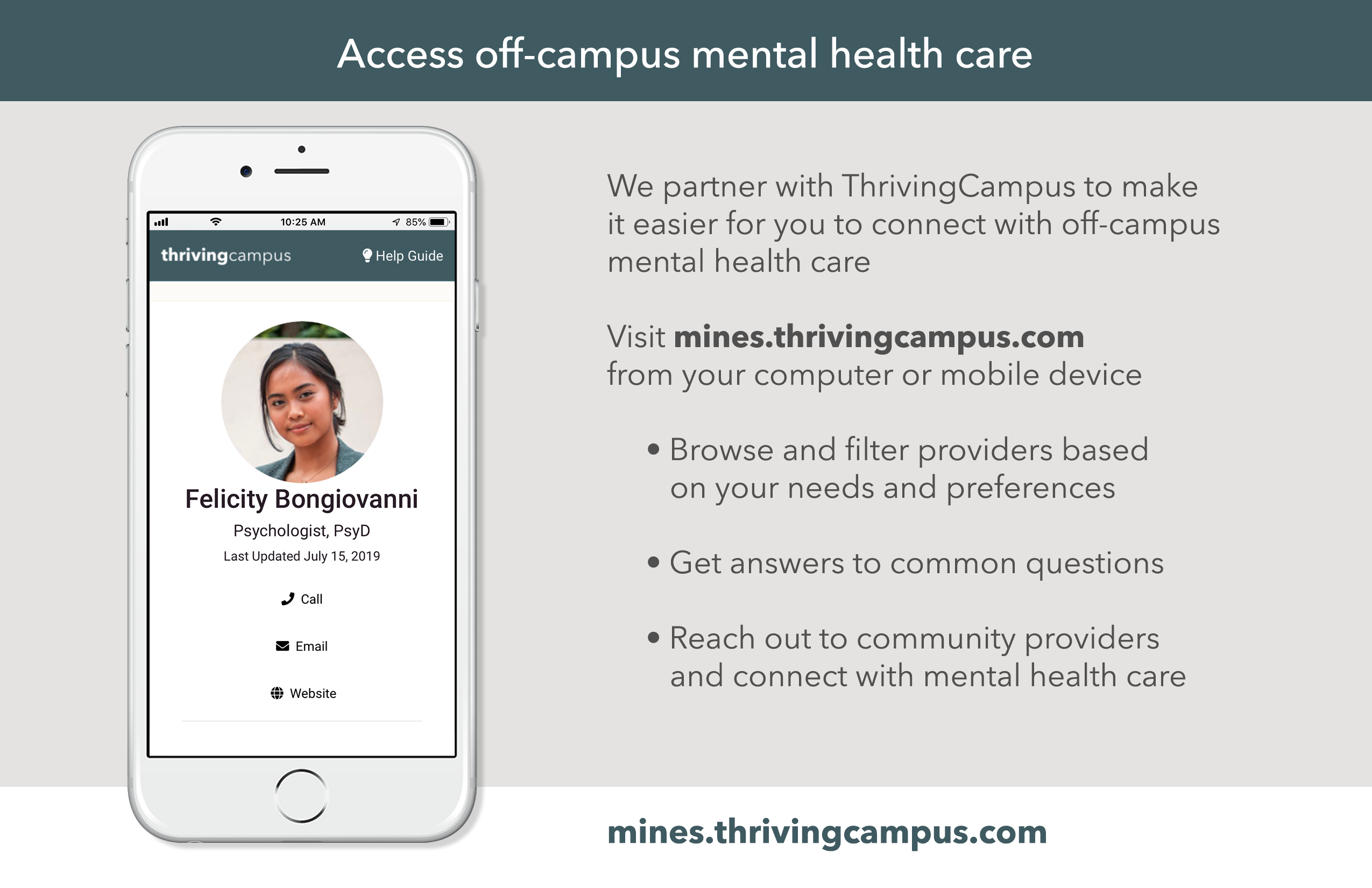Care Coordination
The Counseling Center provides care coordination for students seeking an off-campus counselor. If you would like to receive personalized referral assistance, please submit a care coordination request.
Academic Live Care
Academic Live Care provides free online therapy, psychiatry, urgent care, and nutrition counseling available to ALL Mines students (w/service key and coupon code). Instructions to create an account and get started can be found in the “user guide”.
Types of Mental Health Professionals
Psychologists (PhD, PsyD)
Psychologists hold a doctoral degree in clinical psychology or another specialty such as counseling or education. They are trained to evaluate a person’s mental health using clinical interviews, psychological evaluations and testing. They can make diagnoses and provide individual and group therapy. Some may have training in specific forms of therapy like cognitive behavioral therapy (CBT), dialectical behavior therapy (DBT) and other behavioral therapy interventions.
Degree requirements: Doctor of Philosophy (Ph.D.) in a field of psychology or Doctor of Psychology (Psy.D.).
Licensure & credentials: Psychologists are licensed by licensure boards in each state.
Counselors, Clinicians, Therapists (LPC, LMFT, CAC, LCSW)
These masters-level health care professionals are trained to evaluate a person’s mental health and use therapeutic techniques based on specific training programs. They operate under a variety of job titles—including counselor, clinician, therapist or something else—based on the treatment setting. Working with one of these mental health professionals can lead not only to symptom reduction but to better ways of thinking, feeling and living.
Degree requirements: master’s degree (M.S. or M.A.) in a mental health-related field such as psychology, counseling psychology, marriage or family therapy, among others.
Licensure & Certification: Varies by specialty and state. Examples of licensure include:
LPC, Licensed Professional Counselor
LMFT, Licensed Marriage and Family Therapist
LCADAC, Licensed Clinical Alcohol & Drug Abuse Counselor
Clinical Social Workers (LCSW)
Clinical social workers are trained to evaluate a person’s mental health and use therapeutic techniques based on specific training programs. They are also trained in case management and advocacy services.
Degree requirements: master’s degree in social work (MSW).
Licensure & credentials: Examples of licensure include:
LICSW, Licensed Independent Social Workers
LCSW, Licensed Clinical Social Worker
ACSW, Academy of Certified Social Worker
Psychiatrists (MD, DO)
Psychiatrists are licensed medical doctors who have completed psychiatric training. They can diagnose mental health conditions, prescribe and monitor medications and provide therapy. Some have completed additional training in child and adolescent mental health, substance use disorders or geriatric psychiatry.
Degree requirements: Doctor of Medicine (MD) or Doctor of Osteopathic Medicine (DO), plus completion of residency training in psychiatry.
Licensure & credentials: Licensed physician in the state where they are practicing; may also be “Board Certified” by the Board of Neurology and Psychiatry.
Psychiatric Nurse Practitioners
Psychiatric or mental health nurse practitioners can provide assessment, diagnosis and therapy for mental health conditions or substance use disorders. In some states, they are also qualified to prescribe and monitor medications. Requirements also vary by state as to the degree of supervision necessary by a licensed psychiatrist.
Degree requirements: Master of Science (MS) or Doctor of Philosophy (Ph.D.) in nursing with specialized focus on psychiatry.
Licensure & credentials: Licensed nurse in the state where they are practicing. Examples of credentials include, but are not limited to:
NCLEX, National Council Licensure Examination
PMHNP-BC, Board Certification in psychiatric nursing through the American Academy of Nurses Credentialing Center
Primary Care Physicians (MD, DO)
Primary care physicians and pediatricians can prescribe medication, but you might consider visiting someone who specializes in mental health care. Primary care and mental health professionals should work together to determine an individual’s best treatment plan.
Degree requirements: Doctor of Medicine (M.D.) or Doctor of Osteopathic Medicine (DO).
Licensure & credentials: Licensed physician in the state where they are practicing.
Family Nurse Practitioners (FNP)
Family nurse practitioners (FNP) can provide general medical services like those of a primary care physician, based on each state’s laws. Like primary care physicians, they can prescribe medication, but you might consider visiting someone who specializes in mental health care. Family nurse practitioners and mental health professionals should work together to determine an individual’s best treatment plan.
Degree requirements: Master of Science (M.S.) or Doctor of Philosophy (Ph.D.) in nursing.
Licensure & credentials: Licensed nurse in the state where they are practicing. Examples of credentials include:
NCLEX, National Council Licensure Examination
FNP-BC, Family Nurse Practitioner Board Certified
Student Health Center
Check with the Student Health Center to find out if they are able to assist with your medication management.
Student Health Insurance Plan
The Student Health Insurance Plan provides inpatient and outpatient mental health benefits. Search for mental health providers who accept the SHIP.

 Student Wellness Center
Student Wellness Center
1770 Elm Street, 2nd floor Golden, CO 80401
Monday-Friday 8:00 am-4:45 pm
303-273-3377
Community Providers:
List your practice for free with ThrivingCampus to receive Mines referrals.
